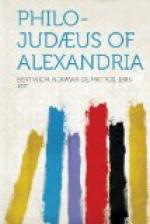We do not know whether Philo attached himself to one of these brotherhoods of organized solitude, or whether he lived even more strictly the solitary life out in the wilderness by himself. Certainly he was at one period in sympathy with ascetic ideas. It seemed to him that as God was alone, so man must be alone in order to be like God.[62] In his earlier writings he is constantly praising the ascetic life, as a means, indeed, to virtue rather than as a good in itself, and as a helpful discipline to the man of incomplete moral strength, though inferior to the spontaneous goodness which God vouchsafes to the righteous. Isaac is the type of this highest bliss, while the life of Jacob is the type of the progress to virtue through asceticism.[63] The flight from Laban represents the abandonment of family and social life for the practical service of God, and as Jacob, the ascetic, became Israel, “the man who beholdeth God,” so Philo determined “to scorn delights and live laborious days” in order to be drawn nearer to the true Being. But he seems to have been disappointed in his hopes, and to have discovered that the attempt to cut out the natural desires of man was not the true road to righteousness. “I often,” he says,[64] “left my kindred and friends and fatherland, and went into a solitary place, in order that I might have knowledge of things worthy of contemplation, but I profited nothing: for my mind was sore tempted by desire and turned to opposite things. But now, sometimes even when I am in a multitude of men, my mind is tranquil, and God scatters aside all unworthy desires, teaching me that it is not differences of place which affect the welfare of the soul, but God alone, who knows and directs its activity howsoever he pleases.”




